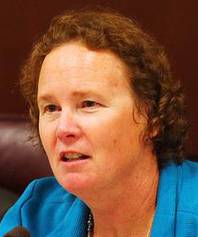Friday, June 24, 2011 | 2 a.m.

Brian Sandoval

Sheila Leslie
Sun coverage
Sun Topics
CARSON CITY — Gov. Brian Sandoval has signed a package of bills that will greatly increase the amount of information about hospital quality available to the public, a “remarkable achievement” toward improving health care safety, according to a legislator.
The five bills followed an award-winning series by the Sun that highlighted the lack of candor among hospitals about quality of patient care, including incidents of infections, accidents and patient readmissions at the facilities.
The legislation requires the state to publish facility-by-facility breakdowns of the “sentinel events” — accidents that are considered preventable.
“Taken together as a package, this was a remarkable achievement,” said state Sen. Sheila Leslie, D-Reno, sponsor of one of the bills.
The medical community, both hospitals and doctors, had in past legislative sessions resisted efforts to increase transparency. But this session, in the wake of the Sun’s five-part series, “Do No Harm: Hospital Care in Las Vegas,” they supported the changes to health care regulation.
“The Sun deserves a lot of the credit for raising public awareness, and increasing consumer demand for the information,” Leslie said. “Those articles were translated into policy improvements that will have a positive effect on the public.”
Richard Whitley, administrator of the state Health Division, said the measures “are good next steps toward greater transparency in health care quality.”
He said the data now must be transformed by state staff into “information that is more useful and understandable to the public, health care providers and policymakers.”
The first report will be due in 2012, Whitley said.
Bobbette Bond of the Nevada Health Care Policy Group said the bills were an important step toward improving health care in Nevada.
But now that the public will be able to compare hospital quality, advocates, hospitals and doctors will have to work at eliminating medical mistakes to lower costs, Bond said. Additionally, future policy discussions will focus on making the cost of procedures transparent, so the public can get even more information to make health care decisions, she said.
Leslie said that before the 2013 legislative session, she will work on language defining the “events” that hospitals have to report.
A Sunday Reno Gazette-Journal story — based on data provided by the Sun — highlighted how hospitals interpret the language affects how they report it.
“Hospitals may be interpreting reporting guidelines differently,” Leslie said. “My next step will be to take a look at how to determine what events to report.”
She proposed defining “adverse events” but “it became complicated very quickly. I think it’ll need more study to clarify the definitions to make sure everyone is reporting in the same manner.”
Meanwhile, the public will start seeing information publicly posted in 2012.
The major bills approved by the Legislature and signed by the governor are:
• Senate Bill 209: Requires the state Health Division to publish annual reports on its website comparing “sentinel events” in hospitals in Clark and Washoe counties. The bill defines a sentinel event as an “unexpected occurrence involving facility-acquired infection, death or serious physical or psychological injury.”
• Senate Bill 264: Requires reporting of the readmissions of patients if the readmission was potentially preventable and related to the initial admission. Money raised through administrative penalties could be used for training to improve the quality of care. The Health Division will report at least quarterly its findings regarding the analysis of trends of sentinel events on the Internet.
• Senate Bill 338: Requires each medical facility and nursing home that provides care to 25 or more patients to report sentinel events to a Centers for Disease Control and Prevention program. The state Health Division would be required to access and publish that information on all medical facilities after Oct. 15, and nursing homes Jan. 1. The reports would allow comparisons among facilities.
• Senate Bill 339: Requires doctors to inform patients about infections acquired in hospitals. The law mandates that patients, or their families or guardians, be told of the infections within five days. There are exceptions, such as when a patient is comatose or suicidal.
• Senate Bill 340: Hospitals and ambulatory surgical centers would be required to report the names of physicians performing surgical procedures and information about those procedures. It is a step toward linking doctors to potentially adverse medical events.

Join the Discussion:
Check this out for a full explanation of our conversion to the LiveFyre commenting system and instructions on how to sign up for an account.
Full comments policy